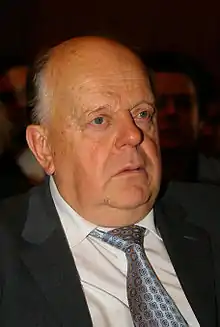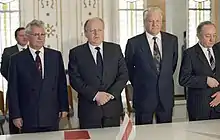Stanislav Shushkevich
Stanislav Stanislavovich Shushkevich (Belarusian: Станісла́ў Станісла́вавіч Шушке́віч, romanized: Stanisłáŭ Stanisłávavič Šuškiévič; Russian: Станисла́в Станисла́вович Шушке́вич; 15 December 1934 – 3 May 2022) was a Belarusian politician and scientist. From 25 August 1991 to 26 January 1994, he was the first head of state of independent Belarus after it seceded from the Soviet Union, serving as Chairman of the Supreme Soviet (also called chairman of Parliament or president). He supported social democratic reforms and played a key role in the creation of the Commonwealth of Independent States.
Stanislav Shushkevich | |
|---|---|
Станіслаў Шушкевіч Станислав Шушкевич | |
 Shushkevich in 2009 | |
| Chairman of the Supreme Council of the Republic of Belarus | |
| In office 25 August 1991 – 26 January 1994 Acting to 18 September 1991 | |
| Prime Minister | Vyacheslav Kebich |
| Preceded by | Mikalay Dzyemyantsyey (as Chairman of the Supreme Soviet of the Byelorussian SSR) |
| Succeeded by | Alexander Lukashenko (as President of Belarus) |
| Personal details | |
| Born | 15 December 1934 Minsk, Byelorussian SSR, Soviet Union |
| Died | 3 May 2022 (aged 87) Minsk, Belarus |
| Political party | Communist Party of the Soviet Union (1968–1990) Belarusian Social Democratic Assembly |
| Children | 2 |
| Alma mater | Belarusian State University |
| Profession | Scientist |
| Awards | |
As a scientist, he was a corresponding member of the Belarusian Academy of Sciences, Doctor in Physics and Mathematics, recipient of various state awards, professor and the author and originator of textbooks and over 150 articles and 50 inventions.
Biography
Shushkevich was born on 15 December 1934, in Minsk. His parents were teachers who came from peasant families. His father, poet Stanislau Petrovich Shushkevich (born 19 February 1908 in Minsk) was arrested in the 1930s and was released from prison in 1956 (but completely exonerated only in 1975). His mother, writer[1] Helena Romanowska was ethnically Polish and her family had szlachta (noble) roots. During World War II Shushkevich lived with his mother and grandmother in Nazi-occupied Minsk, with a Jewish boy hiding in their house.[2]
After finishing school with a medal in 1951, he entered the Faculty of Physics and Mathematics of the Belarusian State University and graduated in 1956. He subsequently studied at the graduate school of the Institute of Physics of the Belarusian Academy of Sciences, conducting research in the field of radio electronics.[3]
In the early 1960s, while working as an engineer in an electronics factory, he was in charge of teaching the Russian language to Lee Harvey Oswald when Oswald lived in Minsk.[4][5] This is confirmed by a CIA document, RIF #104-10014-10053.
He was married to his wife Irina from 1976 onward. According to him, she forced him to start a healthy lifestyle. He had a son named Stanislav and daughter named Elena.[6][7] Shushkevich was admitted to hospital and placed in an intensive care unit in April 2022, due to complications from COVID-19.[8] On the night of 3 May, Shushkevich died in Minsk.[9][10]
Political activity
When Supreme Soviet chairman Mikalay Dzyemyantsyey was ousted for his support of the August 1991 coup attempt, Shushkevich became interim speaker,[11] and presided over Belarus voting to secede from the Soviet Union. He thus became the newly minted nation's first leader. On 18 September, Shushkevich was elected Chairman of the Supreme Soviet.[12]

On 8 December 1991, in Belavezhskaya Pushcha and together with the leaders of Russia (Boris Yeltsin) and Ukraine (Leonid Kravchuk), he signed a declaration that the Soviet Union was dissolved and replaced by the Commonwealth of Independent States; the declaration later became known as the "Belovezh Accords".
Shushkevich had the vestigial Soviet nuclear arsenal (both tactical and strategic) withdrawn from Belarus, without preconditions or compensation from Russia or the West. However, other reforms became stalled due to the opposition from a hostile parliament as well as from Prime Minister Vyacheslav Kebich.
In late 1993, Alexander Lukashenko, the then-chairman of the anti-corruption committee of the Belarusian parliament, accused 70 senior government officials, including Shushkevich, of corruption, including stealing state funds for personal purposes. Lukashenko's accusations forced a vote of confidence, which Shushkevich lost. Shushkevich was replaced by Vyacheslav Kuznetsov and later by Myechyslau Hryb.
At the 1994 Belarusian presidential election (the first one after the secession from the Soviet Union), six candidates stood, including Lukashenko, Shushkevich and Kebich, with the latter regarded as the clear favorite. In the first round Lukashenko won 45% of the vote against 17% for Kebich, 13% for Paznyak and 10% for Shushkevich.
In 2002 Shushkevich sued the Belarusian Ministry of Labor and Social Security: due to inflation, his retirement pension as a former head of state was the equivalent of US$1.80 monthly.[13][14] To earn income, Shushkevich lectured extensively in foreign universities including in Poland, the United States and Asian countries.
In 2004 he attempted to participate in parliamentary elections, but was refused registration by the electoral commission.
He continued to be active in politics,[4][15] heading the Belarusian Social Democratic Assembly party from 1998 until 2018.
Awards and decorations
- 1982, Honored Worker of Science and Technology of the BSSR
- 1997, Polish Prize of Jan Nowak-Jeziorański
- 6 July 2010, Lithuanian presidential Order of Vytautas the Great, "for active support of the independence of Lithuania in 1991"
- 2012, Truman-Reagan Medal of Freedom[16]
- 2018, Belarusian Democratic Republic 100th Jubilee Medal, "for contribution to the Belarusian democracy and independence"
References
- Умер первый глава независимой Беларуси Станислав Шушкевич
- "First leader of independent Belarus Stanislau Shushkevich has died. The life story of personality and politician (Памёр першы кіраўнік незалежнай Беларусі Станіслаў Шушкевіч. Шлях асобы і палітыка)(in Belarusian)". Retrieved 4 May 2022.
- "First leader of independent Belarus Stanislau Shushkevich has died. The life story of personality and politician (Памёр першы кіраўнік незалежнай Беларусі Станіслаў Шушкевіч. Шлях асобы і палітыка)(in Belarusian)". Retrieved 4 May 2022.
- Rice, Mark (10 June 2014). "Back in the USSR: Belarusian leader who helped bury Soviet Union says it is making a comeback". The Guardian. Archived from the original on 18 September 2019. Retrieved 1 August 2019.
- "2013 interview with Shushkevich about Lee Harvey Oswald" (in Russian). 22 November 2013. Archived from the original on 23 February 2019. Retrieved 22 February 2019.
- правды», Татьяна ШАХНОВИЧ | Сайт «Комсомольской (4 December 2014). "Станислав Шушкевич: "Я до сих пор человек Ельцина, а с Кебичем помирюсь - если извинится!"". KP.RU - сайт «Комсомольской правды» (in Russian).
{{cite web}}: CS1 maint: multiple names: authors list (link) - ""Мой папа убил Михоэлса". Кем стали дети руководителей Беларуси". TUT.BY (in Russian). 4 October 2016. Archived from the original on 8 November 2019. Retrieved 1 August 2019.
- "First Leader Of Independent Belarus, Stanislau Shushkevich, In Intensive Care". RadioFreeEurope/RadioLiberty. Retrieved 26 April 2022.
- Умер первый глава независимой Белоруссии Станислав Шушкевич
- Ex-Belarus leader Shushkevich, the man who sacked Gorbachev, dies at 87
- "Высшие органы государственной власти Белорусской ССР". Archived from the original on 24 October 2018. Retrieved 29 June 2021.
- "Беларусь свободна. Назло надменному соседу". 23 September 1991. Archived from the original on 16 July 2021. Retrieved 16 July 2021.
- Как поживают экс-президенты стран СНГ [Life of the Ex-presidents of CIS Countries] (in Russian). Trud. 3 March 2005. Archived from the original on 27 September 2007.
- Шарый, Андрей (11 March 2002). "Stanislav Shushkevich". Radio Liberty (in Russian). Archived from the original on 4 December 2008. Retrieved 20 July 2007.
- Ramani, Samuel (17 April 2017). "Interview with Belarus's First President Stanislav Shushkevich on Lukashenka's Rise and Belarus's Political Future". HuffPost. Archived from the original on 29 March 2020. Retrieved 1 August 2019.
- "Former Leader of Belarus Stanislau Shushkevich to Receive Truman-Reagan Medal of Freedom". charter97.org. Archived from the original on 1 August 2019. Retrieved 1 August 2019.